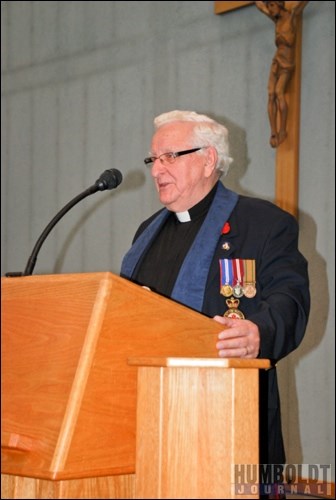It is a time to honour both those who have fallen and those who have survived.That was the message Reverend Al Hingley spoke of at the Humboldt Remembrance Day Service at the St. Augustine Church on November 11. Hingley was not scheduled to give the Remembrance Day speech, but stepped up with short notice that afternoon when the scheduled guest speaker, Richard Brown, was unable to make it to Humboldt. "No one is more disappointed than I am to have received a telephone call from our anticipated guest speaker to say he was unable to be with us," said Hingley. "I was looking forward to hearing what Richard Brown (would say)." Hingley then started off his speech by reciting the famous remembrance poem "In Flander's Fields." "Lieutenant-Colonel John McCrae during the First World War, penned those words to paper," explained Hingley. "Feeling they were inadequate, he scrunched them up and threw them aside." Although he did not feel they were adequate, someone else picked up the poem and presented it to a newspaper, where it was published in 1915. "It became the symbolic poem of Remembrance Day," said Hingley. "Its speaking of the poppy brought the poppy forward to be our symbol of remembrance." The history of the poppy is an amazing story he then shared with the audience. In 1918, Moina Michael brought about 20 poppies to a remembrance service that was held two days after the signing of the armistice, explained Hingley. Through her actions, and a poem she wrote in reply to "In Flander's Fields, she introduced the poppy as the symbol of remembrance. "We continue to honour the memory of those who sacrificed themselves and served a cause they believed to be greater than them," said Hingley. "Often, voices of peace, like McCrae's larks can scarce be heard, but they can be heard, if only we would listen."He explained respect for the poppy, the iconic symbol of remembrance, is the only gift people can give in remembrance to those whose service and sacrifice secured our freedom and restored our safety."All gave some, some gave all," said Hingley. He sees both sides of honouring the sacrifice and disrespect to veterans at Remembrance Day. Last week, Hingley was watching the Ellen DeGeneres Show, when she had a eight-year-old girl dressed as Queen Elizabeth I as a guest.The little girl was passionate about history and would get her teacher's permission to dress up as an iconic hero from history. When DeGeneres asked the girl if she was every teased for her costumes, the girl replied, "No, they never do but we get into conversations when I tell them about the particular hero I am dressed up like that day," said Hingley. "I thought that was a good lead into Remembrance Day because we dress up, even if we only put a poppy on our left side, close to our heart, to remember and demonstrate to others the heroes we remember on November 11 ," said Hingley. Although he is glad to see respect for our history by many, he is concerned about the respect for the poppy and those who sacrificed for the safety of Canadians. "I am concerned when I hear of schools giving students the option to attend or not to attend school services of remembrance, of veterans (facing) bureaucracy, of poppy trays being stolen from places of trust, of Lest We Forget signs being removed from city buses, of the tomb of the unknown soldier being vandalized," said Hingley. He recently heard a story of a veteran who was standing in library queue and moving slowly. When the veteran was told to hurry up, he explained he was moving slow because of his war wounds. The reply he received was, "Tough. No one told you to go." This behaviour from people is what worries not only Hingley, but many other Canadians. To explain his concern with forgetting why we hold Remembrance Day services and shsow respect for those who served, Hingley recited a third poem, explaining the significance of the poppy, from where the poppy grew, to what the colours signify. The poem ended with, "But why mommy are you crying so? Your tears are giving me pain. My tears are my fear for you my child, for the world is forgetting again." The ending was a reminder to all to never forget the brave men and women who served our country to keep us free. "Lest We Forget."
See photo galleries for additional photos.




